Archive for July 26th, 2014

Aunt Dean still dancing at 100th birthday bash
 (CNS): Wearing a glamorous ivory-pink satin gown, Dean Brown, known by everyone as Aunt Dean, danced her way from the entrance of the Brac's civic centre hall all the way to the head table at her 100 birthday bash on Wednesday. Organised by her granddaughter, Speaker of the House Juliana O'Connor-Connolly, the guest list included five generations of family and numerous friends, including Premier Alden McLaughlin and Deputy Premier Moses Kirkconnell. One of her two surviving sisters, Theda Bodden, joined her on the head table, together with her two surviving children, Shirleymae Connor and Annalee Ebanks, plus two sons-in-law Reynold Ebanks and Fitz Gayle (husband of Natalie). (Left: Aunt Dean dances with grandson Bunny Watson)
(CNS): Wearing a glamorous ivory-pink satin gown, Dean Brown, known by everyone as Aunt Dean, danced her way from the entrance of the Brac's civic centre hall all the way to the head table at her 100 birthday bash on Wednesday. Organised by her granddaughter, Speaker of the House Juliana O'Connor-Connolly, the guest list included five generations of family and numerous friends, including Premier Alden McLaughlin and Deputy Premier Moses Kirkconnell. One of her two surviving sisters, Theda Bodden, joined her on the head table, together with her two surviving children, Shirleymae Connor and Annalee Ebanks, plus two sons-in-law Reynold Ebanks and Fitz Gayle (husband of Natalie). (Left: Aunt Dean dances with grandson Bunny Watson)
Aunt Dean was led in by gransons Bunny Watson and Barry Ebanks, and she danced her way up the white carpet that had been laid in her honour for the big party bash at the Aston Rutty Civic Centre on Cayman Brac.
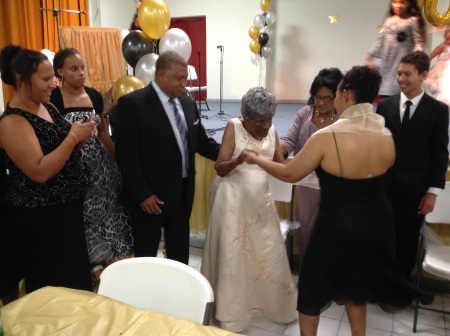 At the feast in her honour, the amazingly spry centenarian was entertained by song and dance performances by some of her grandchildren and great-grandchildren, as well as a poem for the occasion by grandchild Susan Watson. But she just couldn't keep still when well-known performer Burman Scott sang a few good soca songs, and was up and dancing again with Bunny Watson and with great-granddaughter Michella Ebanks (right, dancing with Michella, as daughter Shirleymae, grandson Bunny, great-grandson Simon, and great-granddaughters Mikita and Matasha look on).
At the feast in her honour, the amazingly spry centenarian was entertained by song and dance performances by some of her grandchildren and great-grandchildren, as well as a poem for the occasion by grandchild Susan Watson. But she just couldn't keep still when well-known performer Burman Scott sang a few good soca songs, and was up and dancing again with Bunny Watson and with great-granddaughter Michella Ebanks (right, dancing with Michella, as daughter Shirleymae, grandson Bunny, great-grandson Simon, and great-granddaughters Mikita and Matasha look on).
The church choir from Church of God Holiness in Watering Place sang one of her favourite hyms, "Never grow old", and she quipped to guests that A, G and E are three letters that shouldn't be in the alphabet.
Aunt Dean married Lewin Brown when they were both 17 and they lived in Watering Place throughout their 50 years of marriage until Lewin died in 1983, aged 69. They had six children, 25 grandchildren, 45 great-grandchildren and 13 great-great-grandchildren.
Her younger sister Theda was able to join her for the celebrations. She has another surviving sister, Viola Brown, who was also her sister-in-law, having married Lewin's brother, Lester.
Below: (L-R: Shirleymae Connor, Dean Brown, Annalee Ebanks and Theda Bodden)
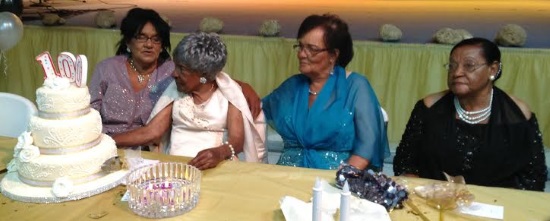
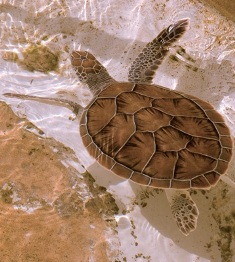
UK MP to press for no turtle meat for tourists
 (CNS): A British Conservative MP will be coming to the CaymanIslands next week to throw his political weight behind the campaign to persuade local restaurants not to sell turtle meat to visitors. A UK charity which is on a drive to transition the Cayman Turtle Farm (CTF) from a meat supplier into a purely conservation-based facility is taking aim at the tourism market as a starting point for reducing what demand exists for the meat. Matthew Offord, the Tory representative for Hendon in North London, will be hosting a reception here and also helping with the UK-based campaign to get the Conservative government to advise UK travellers at least not to eat the meat from the endangered species.
(CNS): A British Conservative MP will be coming to the CaymanIslands next week to throw his political weight behind the campaign to persuade local restaurants not to sell turtle meat to visitors. A UK charity which is on a drive to transition the Cayman Turtle Farm (CTF) from a meat supplier into a purely conservation-based facility is taking aim at the tourism market as a starting point for reducing what demand exists for the meat. Matthew Offord, the Tory representative for Hendon in North London, will be hosting a reception here and also helping with the UK-based campaign to get the Conservative government to advise UK travellers at least not to eat the meat from the endangered species.
Eating turtle in the UK is illegal and in the wake of a recent statement from the UK government advising visitors to Japan not to eat live sushi, World Animal Protection (formerly the World Society for the Protection of Animals) is hoping it can get similar support for a travel advisory along the same lines for eating turtle in Cayman.
Simultaneously, Offord and the WAP will be pressing restaurants here to voluntarily stop promoting the meat to tourists. So far, the Grand Old House is the first and only restaurant to remove turtle from its menu and has agreed to sell it only to locals who pre-order the dish.
Professor Neil D'Cruze from the WAP told CNS that he appreciates that a ban maybe difficult to implement but he is hoping to persuade more restaurants to take the meat off the menu altogether voluntarily or adopt the same position as the Grand Old House, where the campaign launch will be held. The charity also wants to persuade the Department of Tourism (DoT) to support the idea of at least not promoting the meat to visitors as it believes it stimulates a false and unnecessary demand.
Concerned that the CTF has no idea what the real demand for the meat is even from locals, D’Cruze said he was delighted to hear that the Department of Environment has received funding from the UK's department of food and rural affairs' Darwin Initiative to begin a comprehensive survey of that demand and research into the genetic profile of turtles nesting on the beaches to identify the connections of the local wild turtles to the Farm.
That project is unrelated to the WAP campaign and part of the DoE's broader research work into the endangered species and their survival in the wild. It is being led by Dr Ana Nuno from the University of Exeter and is expected to provide the first truly objective information about the origin of turtles that are breeding in local waters, as well as get a true assessment of how much demand there is for meat and the issues surrounding poaching.
The WAP maintains that the CTF slaughters animals without properly assessing demand and also keeps huge numbers of the animals without knowing the true level of consumption and whether it is necessary to breed so many. D'Cruze said that any figures that can give a truer picture of how much and how many local people do eat the meat may help reduce the numbers held at the farm.
Understanding that the effort to transition the facility to conservation will be a long process, he said that simply reducing the numbers held at the farm, which are estimated to currently be more than 9,000 animals, would be a step in the right direction.
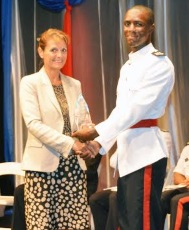
A dozen new cops prepare to hit the beat
 (CNS): Twelve brand new local police officers, eight men and four women who joined he RCIPS just 16 weeks ago, have graduated from their basic training and will be hitting the beat in the coming weeks as they continue learning during a 2-year probationary period. The first ever class made entirely of Caymanian officers includes police constables Gregory Banks Jr, Sarah Joy Bodden, Kishna Burke, Kadane Hall, Craig-Anthony Jervis, Zachary McLaughlin, Kristoff Powell, Andre Savoury, Patricia Sevik, Andrae Strachan, Maxwell Thomas and Nassaria Thompson. PC Powell (left, receiving his award from the governor) was judged Best Overall Recruit. PC McLaughlin was named Best Academic Student and PC Bodden earned the Team Spirit Award.
(CNS): Twelve brand new local police officers, eight men and four women who joined he RCIPS just 16 weeks ago, have graduated from their basic training and will be hitting the beat in the coming weeks as they continue learning during a 2-year probationary period. The first ever class made entirely of Caymanian officers includes police constables Gregory Banks Jr, Sarah Joy Bodden, Kishna Burke, Kadane Hall, Craig-Anthony Jervis, Zachary McLaughlin, Kristoff Powell, Andre Savoury, Patricia Sevik, Andrae Strachan, Maxwell Thomas and Nassaria Thompson. PC Powell (left, receiving his award from the governor) was judged Best Overall Recruit. PC McLaughlin was named Best Academic Student and PC Bodden earned the Team Spirit Award.
Praising their hard work and commitment, Governor Helen Kilpatrick encouraged then to take pride in their purpose as police officers and welcomed the presence of the four women among the new graduates. “All organisations need to recruit and train new staff to benefit from fresh ideas and renewed motivation,” she said.
Commissioner of Police David Baines emphasized the rigorous training and the sanctity of the oath of office that the graduates took upon completion of their course.
“The simplicity of the oath is that it has no exceptions or qualification. It is a commitment to serve all, regardless of status, nationality or gender, to one standard and to do so to the best of their ability,” Baines stressed.
Noting that these police officers come from the same community they serve, he urged them to guard the Cayman Islands’ public without fear or favour while always displaying humanity and caring in the manner in which they engage with the people.
The recruitment campaign targeting those between 18 and 30 years, launched on 1 October 2013, and attracted over 500 applicants. This was sifted down to 200 candidates, based on recruitment criteria. The final 12 were then selected through written exams, physical tests, presentations and interviews, the audience heard.
Trainer and master of ceremonies PC Halston Farley noted that in addition to four weeks of relevant practical training, the new officers would continue to learn as part of a two-year probationary period.
“Your journey has just begun; continue to abide by your promise to the organization and your communities at large. Learning has not ceased just because you have completed your training,” he told the graduates.
Expressing appreciation on behalf of his fellow graduates for all the training opportunities, including team-building exercises, PC Thompson said the group was now better equipped for their police duties, and had received “invaluable life lessons moving forward”, as well as advanced their self-knowledge.
She said they were particularly grateful to their trainers: Sergeant Andrew Harrison (head); PCs John Rowell, Roje Williams, Gabe Rabess, Halston Farley (also drill instructor) and Senior PC Paulette Hines, with 15 other officers also providing individual lessons.
Below: Led by PC Andrew Stewart, the graduates march past before Governor Helen Kilpatrick, Commissioner David Baines and Aide-de-Camp, Inspector Ian Yearwood.
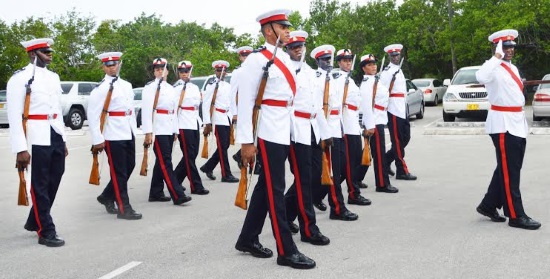
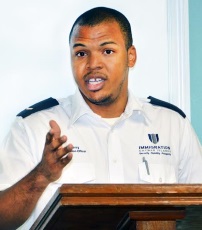
Immigration officers warned about first impressions
 (CNS): The deputy governor explained to a group of new immigration recruits about to hit the front line in Cayman's border control that they would be the first government workers that visitors to Cayman will see. He urged them to take their new jobs seriously and consider how they interact with people as they are responsible for the first impression of Cayman. "This is a serious responsibility – take it seriously," said Franz Manderson. The civil service boss urged Devin Bodden, Staciemae Jackson, Yannick Powell, Jarrett Terry (left) and Marco Thompson to do their vital job well, regardless of personal bad days, ill-health, lack of sleep or emotional upsets. He also advised them that climbing the corporate ladder was about getting "noticed in a very good way”.
(CNS): The deputy governor explained to a group of new immigration recruits about to hit the front line in Cayman's border control that they would be the first government workers that visitors to Cayman will see. He urged them to take their new jobs seriously and consider how they interact with people as they are responsible for the first impression of Cayman. "This is a serious responsibility – take it seriously," said Franz Manderson. The civil service boss urged Devin Bodden, Staciemae Jackson, Yannick Powell, Jarrett Terry (left) and Marco Thompson to do their vital job well, regardless of personal bad days, ill-health, lack of sleep or emotional upsets. He also advised them that climbing the corporate ladder was about getting "noticed in a very good way”.
To do that, he said, they had to be consistently reliable, punctual and provide the best customer service possible and to remain ambitious. Having served most of his civil service career at immigration, Manderson said he had been determined to give a good impression.
Welcoming the four men and one woman into the immigration family, Chief Immigration Officer Linda Evans described their role as the islands’ gatekeepers. She also explained about the induction programme, which involved 12 months of extensive training, as she asked them to maintain a positive and helpful attitude towards customers and fellow workers.
Evans spoke about the need for teamwork in a good immigration service as well as knowledgeable officers, and urged them to keep up to date on the relevant laws, regulations and policies. The head of border control also said it was equally important for the officers to be open to change and provide feedback to help solve problems and enable the department to remain dynamic.
During the graduation the new recruits received awards, which included the most improved overall award, which went to Powell, while the award for consistency in effort and application of laws, policies and procedures went to Thompson. Jackson received both the highest overall proficiency and highest academic average awards, while the officer rating highest on 33 skills encompassing attitude, knowledge and expertise was Bodden. Selected by his peers for the Spirit Award, Terry gave the student address. Emphasising their achievement in completing the training period, he remarked that they looked forward to challenging but exciting careers.
Meanwhile, Home Affairs Deputy Chief Officer Wesley Howell said it was of vital importance that they represent themselves well in and out of uniform and spoke about work-life balance.
Below: The new officers share a moment with Deputy Governor Franz Manderson, Chief Immigration Officer Linda Evans, her deputies and other staff of the Immigration Department.
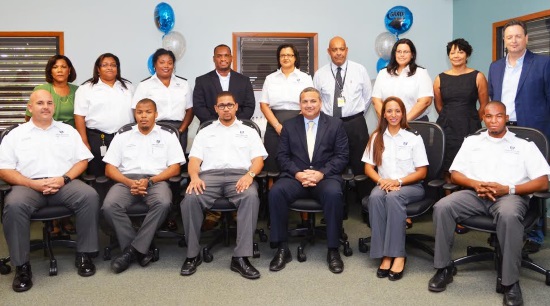

Club helps feed rehab’s mental health clients
 (CNS): Although the Cayman Islands authorities are facing some pressing issues concerning the treatment of and support for the mentally ill, the Department of Community Rehabilitation recently received a donation from a local service club to help keep their clients fed. The Rotaract Club of Grand Cayman (RCGC) has for the second year provided brown paper-bagged meals to the department to give to its clients. DCR Director Teresa Echenique-Bowen said the club's contribution to help adult offenders diagnosed with mental illness demonstrated how the wider community can help make a difference in the system. RCGC has provided 25 meals a month on average to people appearing before the special Mental Health Court.
(CNS): Although the Cayman Islands authorities are facing some pressing issues concerning the treatment of and support for the mentally ill, the Department of Community Rehabilitation recently received a donation from a local service club to help keep their clients fed. The Rotaract Club of Grand Cayman (RCGC) has for the second year provided brown paper-bagged meals to the department to give to its clients. DCR Director Teresa Echenique-Bowen said the club's contribution to help adult offenders diagnosed with mental illness demonstrated how the wider community can help make a difference in the system. RCGC has provided 25 meals a month on average to people appearing before the special Mental Health Court.
“This is an excellent example of how service organisations and government entities can work together to benefit our community," Echenique-Bowen said. "It is important for us to realise that community needs are not the sole responsibility of government, but to call for a holistic approach and collaboration to make a difference in our Islands."
She invited other interested service clubs and private sector organisations to contact DCR if they can also offer help to the mental health court, its clients or other programmes and services.
Rotaract President Stephanie Rattan explained why the club got involved: "We saw the need and were happy to assist. Our members look forward every month to packing the lunches with inspirational quotes and sayings, then handing them over to the clients.”
DCR had launched the Brown Paper Bag drive in 2010 to provide the meals but the Rotaract Club of Grand Cayman (RCGC) took over the initiative in July 2013 and continues to provide the monthly lunches. The club members pack them in brown paper bags decorated with creative and inspiring messages and take them to DCR on the day the court is held so that they can be distributed to mental health clients when they leave. Each meal consists of a drink, chips, cookie, fruit and either a sandwich or a pattie.
Government officials explained that in response to an increasing number of adults with mental health illnesses appearing before the criminal justice system, DCR had proposed the idea of a multi-disciplinary approach to best meet the needs of these individuals and to develop treatment plans to enable community-based supervision.
With the support of Chief Justice Anthony Smellie and former Chief Magistrate Margaret Ramsay-Hale, mental health court services were implemented in 2009. Clients attend court on Wednesdays once a month.
The court has a structured treatment team including magistrate, prosecutor, defence attorney, probation, prison and mental health officers, including a psychiatrist, a psychologist and a mental health community nurse. The Department of Children and Family Services (DCFS) as well as the Counselling Centre are other key agencies that provide services to meet clients’ needs as they arise.
At court sittings the offenders receive acknowledgement and recognition when they are doing well but are held accountable when they are not. Treatment has proven to be more effective and efficient when emphasis is placed on rewarding and praising persons for their achievements.
DCR is responsible for providing social inquiry reports, case status updates, and bail monitoring for the court, as well as supervision of orders from the court and the facilitation of various group services.
Prior to every court session, the team discusses the progress and treatment plan of each individual client. The supervision of these clients is primarily carried out by DCR and mental health community nurses. It entails frequent contact with their family and social support at home or at work, liaison with key agencies such as substance abuse treatment providers and DCFS and making appropriate referrals to treatment providers, the National Workforce Development Agency and the DCFS.

Global temperatures continue to break records
 (CNS): Climate experts said this week that it is getting hotter and hotter as the latest statistics reveal another increase in the average monthly temperature breaks records. June saw another global heat record 'hot' on the heels of the temperatures set in May. According to the National Oceanic and Atmospheric Administration (NOAA), the average global temperature in June was 61.2 degrees, which is 1.3 degrees higher than the 20th century average, and beat the record set in 2010 by 1/20 of a degree. Experts said the man in the street may think that sounds insignificant but “it’s like winning a horse race by several lengths” when it comes to temperature records, NOAA climate monitoring chief Derek Arndt said.
(CNS): Climate experts said this week that it is getting hotter and hotter as the latest statistics reveal another increase in the average monthly temperature breaks records. June saw another global heat record 'hot' on the heels of the temperatures set in May. According to the National Oceanic and Atmospheric Administration (NOAA), the average global temperature in June was 61.2 degrees, which is 1.3 degrees higher than the 20th century average, and beat the record set in 2010 by 1/20 of a degree. Experts said the man in the street may think that sounds insignificant but “it’s like winning a horse race by several lengths” when it comes to temperature records, NOAA climate monitoring chief Derek Arndt said.
The world’s ocean tempura turns were also on the increase breaking the monthly heat record at 62.7 degrees becoming the hottest the oceans for any average month and it is the oceans which are currently pushing up the air temperatures as well.
“We are living in the steroid era of the climate system,” Arndt added.
Although the United States had only its 33rd hottest June, heat records were broken in June on every continent but Antarctica. Particularly high temperatures were recorded in New Zealand, northern South America, Greenland, central Africa and southern Asia.
According to NOAA, the first six months of this year were the third warmest first six months on record, trailing 2010 and 1998. June was the 352nd hotter-than-average month in a row as determined by global temperature records dating back to 1880. All 12 of the world’s monthly heat records have been set since 1997, more than half of them in the last decade.
While global warming will be bad news for everyone in the end the first places to suffer will be low lying islands such as the Cayman Islands where bleaching and other problems will destroy our reefs but where rising sea levels will see increasing land erosion problems.

WestStar blamed for LIME internet crash
(CNS): Local telecommunications firm LIME suffered a seven hour fixed line and internet crash Thursday afternoon because one of its competitors cut through one of its cables. WestStar, which is one of a number of communication firms digging up Grand Cayman's roads at present in order to upgrade their service, reportedly cut through the LIME line at around noon, blacking out its competitor's services. "As soon as we were made aware of the problem, our technicians worked diligently to repair the cable and to restore service. All services were restored at approximately 7:30pm," a spokesperson for LIME stated. "We are very sorry for the interruption to your service and are working with our competitors to make sure this doesn’t happen in the future."